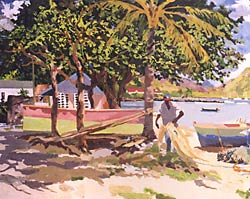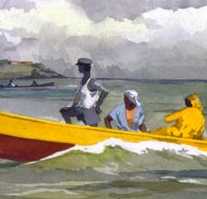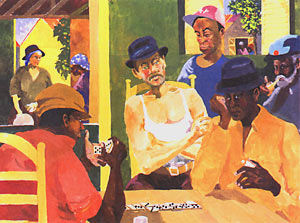Omeros:
Caribbean Epic |
| What is an Epic?
"A long narrative poem
in elevated style presenting characters of high position in adventures forming an organic
whole through their relation to a central figure and through their development of episodes
important to the history of a nation or a race." (Harmon & Holman. A
Handbook to Literature. 7th ed.) |
 "Preparing
the Net," 1999, oil on canvas by Derek Walcott. |
Characteristics of an Epic
- Characters are larger-than-life beings of national importance and
historical or legendary significance.
- The setting is grand in scope, covering nations, the world, or even
the universe.
- Action consists of deeds of great valor and courage.
- Style is sustained in tone and language.
- Supernatural forces interest themselves in human action and often
intervene directly.
|
Particular Epic Techniques in the
Western Tradition
- An invocation to the Muse for inspiration in the
telling of a story.
- Epics tend to start in medias res. "In
the middle of the action."
- Epic catalogues list warriors, armies, etc.
- Dialogues tend to be extended, formal speeches.
- Epic similes are frequent.
epic
simile: "a long, grand comparison which is so vivid that it temporarily displaces
the object to which it is compared."
|
Questions about Omeros' Epic Nature
|
- Look over the general definition and characteristics of an epic.
Which aspects of these has Walcott adopted for his epic? Which aspects has he
altered? What is he trying to suggest by doing this--about the nature of the
Caribbean? about the nature of heroics? about the nature of race and culture?
- Look at the invocation on pages 2983-2984. What are the
characteristics of Achille that Walcott praises? What is he choosing to stress
about Caribbean life here? Compare this with the invocation to Homer's Iliad
translated below.
- Look at the selection from Book Six on pages 2981-2982. This is
an example of a modern epic catalog. Why would Walcott put together such a list?
- Read the dialogue between Achille and his ancestor Afolabe.
What do we learn about the nature of Achille's lost heritage?
|
 "Omeros"
1990, oil on canvas by Derek Walcott |
| "Sing, O goddess, the anger of Achilles
son of Peleus, that brought countless ills upon the Achaeans. Many a brave soul did it
send hurrying down to Hades, and many a hero did it yield a prey to dogs and vultures, for
so were the counsels of Jove fulfilled from the day on which the son of Atreus, king of
men, and great Achilles, first fell out with one another. And which of the gods was it
that set them on to quarrel? It was the son of Jove and Leto; for he was angry with the
king and sent a pestilence upon the host to plague the people, because the son of Atreus
had dishonoured Chryses his priest." Homer. Iliad Book 1. trans. Samuel
Butler. |
Questions about Omeros' General Message
|
 "Domino Players," gouache on
paper, done by Derek Walcott in 1999. |
- How would you describe Achille's making of a pirogue (dugout canoe)?
Is it a spiritual experience? Why or why not?
- What is Walcott suggesting about the Caribbean past and present by
describing the myth of the sunken galleon?
- What kind of realm does the underworld represent for Achille?
- What does Achille's dream return to the Nigeria of the Yoruba
represent? What do we learn of him?
- What connection does Achille see between the Christmas dance and his
African ancestry?
- What connection does Walcott draw between his visiting of the trail
of tears in the United States and his culture's past?
|
|


